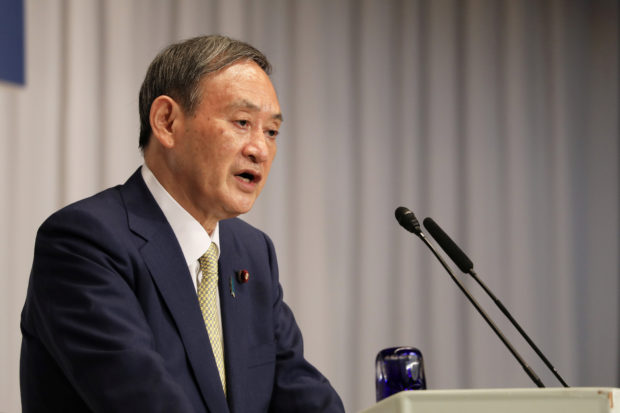Japan’s opposition unites as Suga set to succeed Prime Minister Abe

Japanese Chief Cabinet Secretary Yoshihide Suga presents his policy ideas to party members at the Liberal Democratic Party’s (LDP) leadership election in its headquarters in Tokyo, Japan, September 8, 2020. Du Xiaoyi Pool via REUTERS
TOKYO — Eight years after Japan’s Democratic Party was ousted and began unravelling, opposition groups are once again unifying for a general election that could come soon, but they face an uphill battle to dent the current ruling bloc’s performance.
The drive to unite has taken on new urgency as the dominant Liberal Democratic Party (LDP) prepares to pick a new leader on Sept. 14 after Prime Minister Shinzo Abe said last month he would resign because of an illness.
Japan’s center-left opposition, the Constitutional Democratic Party of Japan (CDPJ), will merge with most of its former colleagues in the Democratic Party for the People (DPP) next week after picking a new leader on Thursday.
The two groups, plus a batch of unaffiliated opposition MPs, emerged when the Democratic Party imploded in 2017 before a general election that the LDP won handily.
The newly merged party, to be formally launched on Sept. 15, could face an early test.
Article continues after this advertisementAbe’s lieutenant, Chief Cabinet Secretary Yoshihide Suga, is expected to win the LDP race, virtually assuring he becomes premier because of the party’s majority in parliament.
Article continues after this advertisementSuga and the LDP have already gotten a bump in voter surveys, and speculation is mounting that he will swiftly call a general election.
A strong performance by the LDP would boost Suga’s chances of winning a full three-year term after finishing Abe’s tenure.
“Inside the LDP, everyone knows it (support rates) will never be this high again,” said Steven Reed, a professor emeritus at Chuo University. Support for the LDP had risen to 41% from 33% in a recent Yomiuri newspaper survey, compared with 4% for the CDPJ.
Abe’s nearly eight-year rule, which made him Japan’s longest-serving prime minister, was aided by the fragmented opposition because of Japan’s electoral system, in which most constituencies elect a single member of parliament to the lower house.
That means the ruling party benefits if several opposition candidates compete. In the last lower-house election, in 2017, the CDPJ won just 54 seats, a fraction of the two-thirds majority garnered by the LDP and its smaller coalition partner.
The new opposition party, which will most likely be led by CDPJ chief Yukio Edano, will have 149 incumbents out of a combined 710 lawmakers in parliament’s two chambers, compared with the LDP’s nearly 400.
“If a party has only 50-60 members, even if it speaks of taking power, it’s a joke,” Jun Azumi, who handles parliamentary affairs for the CDPJ, told Reuters in an interview. “In that sense, to create a big group is extremely significant.”
The merged party will likely cooperate with the Japanese Communist Party in fielding candidates, a stance that helps its chances but may put off some of the DPP’s more conservative members.
Edano said on Wednesday he wanted to adopt a realistic stance toward the goal of ending reliance on nuclear power.
“The first thing we would have to do … is decide what to do with the spent fuel. Just spewing out slogans isn’t going to be realistic unless we can make that decision,” Edano – who was top government spokesman during the 2011 Fukushima disaster – said in a televised debate.
The centrist Democratic Party of Japan (DPJ), founded in 1996, has long struggled with internal dissent.
“Opposition parties are not even close to being united,” said Meiko Nakabayashi, a professor and former DPJ lawmaker. “They say they will be, but it’s really doubtful.”
The Democrats ousted the long-dominant LDP in 2009 but after a troubled three years, lost power.
Katsuya Okada, who led the DPJ from 2004-2005, said unifying members was a big challenge.
“What I struggled with most was to pull the party together,” Okada said. “While respecting diversity, each member must bear in mind the importance of coming together … under a chosen leader.”